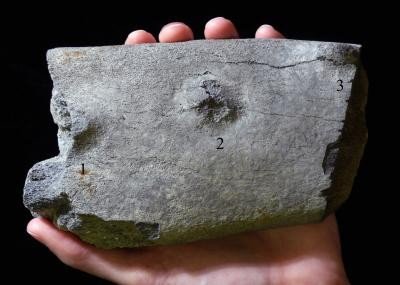Whale bone fossil showing three tooth marks from a shark. The whale appears to have been an ancestor of a great blue or humpback. Credit: Stephen Godfrey
WASHINGTON, Nov. 11 (UPI) -- An ancient shark attack has been preserved in the form of a fossilized whale bone bearing marks of the assault, U.S. paleontologists say.
Scientists with the Smithsonian Institution say the fragment of whale rib found in a North Carolina strip mine offers a rare look at the interactions between prehistoric sharks and whales during the Pliocene Epoch 3 million to 4 million years ago.
Three tooth marks on the rib suggest the whale was once severely bitten by a strong-jawed animal, and the wide spacing between tooth marks makes scientists believe the attacker was a mega-toothed shark Carcharocles megalodon, a Smithsonian release said Friday.
Scientists know the whale survived that attack because "most of the fossil fragment is covered with a type of bone known as woven bone, which forms rapidly in response to localized infection," Don Ortner of the Smithsonian's National Museum of Natural History said.
Based on the tooth marks, scientists said they believe the shark was relatively small, between 13 and 26 feet long.
"One certainly doesn't expect to find evidence of animal behavior preserved in the fossil record, but this fossil shows just that, a failed predation," said Stephen Godfrey, paleontologist at the Calvert Marine Museum in Solomons, Md., and a Smithsonian research collaborator who discovered the fossil. "The shark may have gone away with a mouthful, but it didn't kill the whale.
"This fossil is one of a very few examples that shows a trauma clearly attributed to another animal, yet also shows the victim survived the event."















